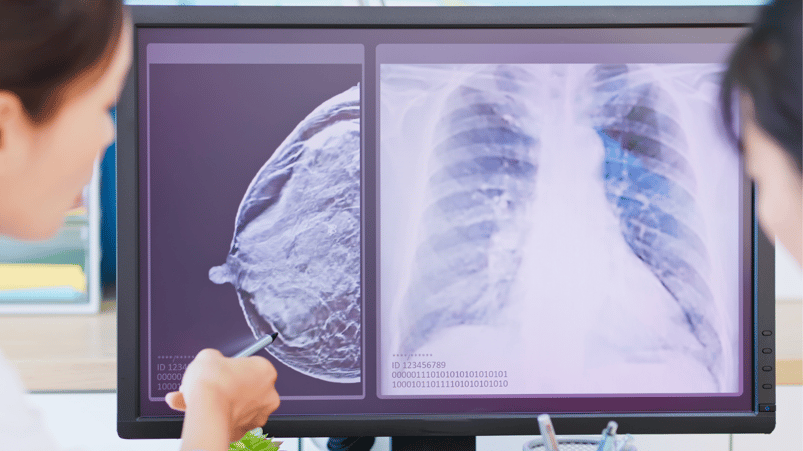What is Metastatic Breast Cancer (mBC)?
The Difference Between Breast Cancer and Metastatic Breast Cancer
Initially, breast cancer develops when abnormal cells divide at an increased rate that is difficult to control. These abnormal cells can form together to make a tumor (Cleveland Clinic). Breast cancer only found in the breast and/or nearby lymph nodes is known as early-stage or locally advanced breast cancer (Cancer.Net).

Metastatic breast cancer occurs when breast cancer has spread to other parts of the body (Cancer.Net). Spreading may develop if breast cancer cells enter the bloodstream or lymphatic system. These cells travel through the body and can settle in different parts to form new tumors (Cancer.Net).
Most commonly, metastatic breast cancer spreads to the liver, bones, lungs, or brain. This type of cancer is an invasive breast cancer, also known as stage IV (the most advanced breast cancer stage) (BREASTCANCER.ORG).
When a person living with breast cancer experiences metastasis, the type of cancer will continue to be referred to as breast cancer. Healthcare professionals classify cancer based on its primary place of origin. For example, if cancer cells found in a bone have originated from the breast, they are still breast cancer cells and will continue to be referred to as breast cancer (Cleveland Clinic).
Risk Factors for Metastatic Breast Cancer
The type of initial breast cancer and corresponding growth rate can put individuals at a higher risk. For example, HER2-Positive Breast Cancer and Triple-Negative Breast Cancer may spread faster than Hormone Receptor-Positive Breast Cancer (Cancer.Net 1; Cancer.Net 2).
Risk factors for breast cancer include (WebMD; MayoClinic):
- Family history: You may inherit genetic mutations that may increase your risk of breast cancer.
- Personal history: If you have already had breast cancer, you have a higher chance of recurrence.
- Smoking: Can increase the risk of cancer in almost any part of the body.
- Poor diet or overconsumption of alcohol: Large amounts of saturated fats or exceeding one drink a day can increase your likelihood of breast cancer.
For more information on breast cancer risk factors, click here.
Signs and Characteristics
Signs and characteristics experienced by individuals with metastatic breast cancer change based on the location of metastasis. Some signs and characteristics in the primary areas where individuals experience the spreading of metastatic breast cancer include (National Breast Cancer Foundation):
- Metastasis in the bone: Severe and progressive pain, swelling, and an increased risk of bone fractures or breaks.
- Metastasis to the brain: Persistent headaches, vision disturbances, seizures, nausea, vomiting, behavioral changes, and personality changes.
- Metastasis to the liver: Jaundice (yellowing of the skin or eyes), itchy skin, rashes, abnormally high enzyme counts (in the liver), abdominal pain, appetite loss, nausea, and vomiting.
- Metastasis to the lungs: Chronic cough, inability to get a full breath, chest pain, fatigue, weight loss, and poor appetite.

Therapy for Metastatic Breast Cancer
As metastatic breast cancer is the most advanced breast cancer stage, treatments act to shrink tumors, slow growth, improve symptoms, and help individuals have a better quality of life (Cancer.Org). Systemic therapy is the primary method used to treat metastatic breast cancer. According to the American Cancer Society, some of the most used systemic therapy treatments are chemotherapy, hormonal therapy, targeted drugs, and immunotherapy:
- Chemotherapy: It aims to keep cancer cells from growing or dividing. This treatment is injected into the vein or taken orally. Chemo travels through the bloodstream to reach cancer cells in most body parts. The type of chemo distributed depends on the patient’s overall health, treatment history, potential side effects, and preferences.
- Hormone therapy: Some types of breast cancer cells can grow by attaching to hormones, such as estrogen and progesterone. Tumors that test positive for estrogen or progesterone receptors may be treated by hormone therapy. This therapy aims to lower estrogen and progesterone levels in the body or stop these hormones from attaching to these receptors.
- Immunotherapy: This therapy is also known as biological therapy. It aims to boost an individual’s immune system to target and destroy cancer cells more effectively. Immune checkpoint inhibitors are a type of immunotherapy used for recurrent and advanced or metastatic breast cancer. Immune checkpoint inhibitors block proteins in the immune system so that immune cells better recognize and attack tumors.
For more information about therapy types, visit our Metastatic Breast Cancer page.
Living with Metastatic Breast Cancer
It is normal to feel a range of emotions when you have been diagnosed with metastatic breast cancer. These emotions may include anxiety, stress, anger, and depression. There isn’t one way to feel about receiving the diagnosis. It is important to note that a good quality of life is attainable for months or years - depending on treatment effectiveness and your overall health (American Society of Clinical Oncology).
When the diagnosis is received, focusing on understanding treatment options and finding as many resources as possible may be helpful. Having more knowledge about metastatic breast cancer can empower you to take control of your health journey, improve your quality of life, and can help manage uneasiness (breastcancer.org).
The Importance of Wellness
It is important to remember that metastatic breast cancer treatment goes beyond physical treatment. Emotional well-being and self-care play a significant role in improving your emotional health (breastcancer.org).

Some activities that contribute to your emotional health include (breastcancer.org):
- Taking a walk
- Journaling
- Meditating or praying
- Talking with a counselor, social worker, or psychologist
- Join a support group
- Do yoga or gentle stretching
- Listening to music
- Going to the movies
- Having coffee with a friend
The National Cancer Institute suggests some of the following ways to cope with emotions:
- Express your feelings: It’s important to express what you feel. You can talk to friends, family, cancer survivors, support groups, or therapists. If you are not ready to talk, you can express your feelings by thinking about them or writing them down.
- Not blaming yourself: All bodies are different, and anyone can go through a cancer diagnosis.
- Stay active: Take up activities that help you focus on other things besides your diagnosis.
- Look at what you can control: Take an active role in your health care, find resources, ask questions, attend appointments, and adjust your lifestyle as needed.
Support platforms can help you take control of your health journey by making activities, like finding health resources, easier. A new platform, the Alberta Metastatic Breast Cancer (mBC) Support Platform, has been created to help improve decision-making and care for people living with metastatic breast cancer. Find out more about this platform below.
The Alberta Metastatic Breast Cancer (mBC) Support Platform
Dr. Nancy Nixon, a Medical Oncologist and the Southern Alberta Breast Tumour Team Lead, co-created the application features with metastatic breast cancer patients using an Alberta-based health platform called the Zamplo App. The platform is customized based on your subtype: HER2-positive, hormone receptor-positive HER2-negative, and triple-negative.
The mBC Support Platform provides an easy way for you and your caregivers to:
- Track medications, supplements, symptoms, activities, and health-related data
- Prepare for appointments
- Access credible and relevant resources
- Connect with others living with metastatic breast cancer
- Search for metastatic breast cancer clinical trials

The support platform prioritizes data privacy and security:
- All the data on the platform is always encrypted and stored in Canada
- Personally identifiable information will never be disclosed without consent
- You own all the data you add
- You can choose whom you want to share your data with
- You can delete your account anytime
Learn more about the Alberta mBC Support Platform and join for free today.
Share this
You May Also Like
These Related Stories
-Jun-16-2023-01-45-12-7884-AM.png?width=940&height=788&name=Updated%20Blog%20Images%20(Blog%20listing)-Jun-16-2023-01-45-12-7884-AM.png)
Prioritizing Quality of Life with Metastatic Breast Cancer
%20(1).png?width=940&height=788&name=Updated%20Blog%20Images%20(Blog%20listing)%20(1).png)
Myths About Polycystic Ovary Syndrome (PCOS)
%20(17).png?width=940&height=788&name=Updated%20Blog%20Images%20(Blog%20listing)%20(17).png)
.png?width=500&height=200&name=Zamplo%20Logo%20(1).png)




No Comments Yet
Let us know what you think